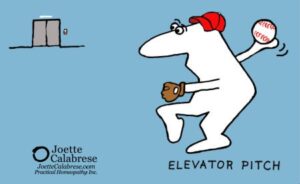We tend to socialize more during the holidays, wouldn’t you say? Thanksgiving, Passover, Christmas, New Year’s and all the other end-of-year occasions are a focal point for family and friends to get together. And you know what that means? Small talk, conversation, sharing and answering the usual twenty questions.
“How’s your grandmother?” “Are the kids enjoying school?” “Think it’s going to snow?” “What the heck is homeopathy?”
Wait. What?
By now, you know I always say, “Pass on the good news of homeopathy.” But do you have a short answer at the ready when you have the opportunity to share your knowledge?
No? Well, let’s work on that, shall we?
Succinct answers about broad topics are often called “elevator pitches.” (No, you don’t need a baseball. It’s not that kind of pitch.)
In many social situations, you may only have a short, finite amount of time to share a compelling answer. So, an elevator pitch is so named because it should be no longer than a short ride in an elevator — a quick, concise speech given to create interest in a particular subject.
Keep in mind, this isn’t a presidential debate. You’re not necessarily trying to win approval or gain converts. This is a friendly conversation, not an opening salvo. Your sole motivation is simply to ignite their curiosity.
My go-to elevator speech goes a little something like this:
“You know when you go to your doctor because you keep having sinus infections over and over again, or those urinary tract infections keep coming, or that eczema is now worse than ever? Now, you can’t have gluten, and you can’t have dairy. Well, homeopathy is the medicine that uproots all that. Homeopathy is the medicine we really were supposed to be getting all along. If you’re interested, you can go to my website where I talk about it and give lots of information for free.”
Again, you’re not trying to come across as pushy or defensive. You’re simply encouraging their interest.
Perhaps it will take a few weeks for them to absorb your comments before they reach out to ask more. Or their next words might be, “So, do you know a homeopathic medicine for __________?” (They’ll fill in the blank with their main concern: gout, arthritis, eczema, whatever.)
Congratulations! You apparently gave a great elevator speech. They’re interested. That is your cue to reply with a bit more of your knowledge, but, more importantly, point them in the right direction to gain their own knowledge.
Indeed, no one likes to be preached to, especially in a social situation. But almost everyone can appreciate an opportunity to learn more when they're ready. Our intention through our elevator speech should be to empower our friend or loved one to solve their own problems.
I devote a lesson in The Academy of Practical Homeopathy® to crafting an expert elevator speech. Obviously, I can’t cover everything in this venue, but here are a few insights into creating something you’ll feel comfortable with. Careful attention to these six questions can help you create multiple elevator speeches that are appropriate as you encounter diverse individuals with their own situations, ailments and concerns.
- What is the problem?
- Who has the problem?
- Who am I, the problem solver?
- How can I gain the trust of the person who has the problem?
- How has the solution to the problem helped me?
- And finally, what is the solution to the problem?
Focusing on another’s problem (pain or suffering) will help you gain their trust. You’ll immediately be viewed as “on their side.” That will open the door for them to ask you further questions as they become more curious.
People also respond well to personal stories. An excellent and straightforward guide you can use for sharing your experience with homeopathy is what’s called the “Pixar Pitch.” A Pixar Pitch is essentially a simple formula developed by Daniel H. Pink from his observation of Pixar films. It’s a compelling way to advocate for homeopathy.
Here is the 6-sentence outline. It is up to you to fill in the blanks. But in the brackets, I have included hints to help you think about how to fill them in:
- “Once upon a time _______. [The setting]
- Every day ______. [The problem and possible reason for it]
- One day ______. [The plot twist or turn of events]
- Because of that ______. [The consequence of that turn of events]
- Because of that ______. [The resulting action taken because of the turn of events and its consequence]
- Until finally ______.” [The solution]
Now, I’m not saying you should begin your stories with “Once upon a time …” That would be a little silly. But you get the idea. This structure is designed to help you organize your homeopathy story in a compelling way. Here’s my example:
- Once upon a time, as a young child, I developed eczema; my mother loved me so much that she didn’t want me to suffer, so I grew up using steroid creams and drugs in hopes of getting rid of the eczema.
- Every day, I got worse. The steroid cream wasn’t working as well as it used to, and I had developed other health problems, chemical sensitivities, allergies, could only eat about eight foods, and was very sick.
- One day, I decided to stop taking drugs of commerce and turned to alternative medicine — taking loads of vitamins and supplements, and using herbs and essential oils, etc.
- Because of that, I remained sick, and my life was severely limited, so I searched for something else to make me healthy.
- Because of that research, I discovered homeopathy.
- Until finally, a professional homeopath gave me Nux vomica, which began to heal me, and my whole sickly, limited life finally opened up because I regained my health through homeopathy.
You see? A well-placed story can be the most interesting and effective way to help people see the fruits and successes of homeopathy. Stories are how people connect, especially when you tell a story that relates to an aspect of another person’s life.
But don’t forget to read the room. Watch your listener's face and body language. Observe how deeply interested they might be at that particular moment. Then, tailor what you say to their level of interest.
Again, focus your intention on simply awakening their fascination. Let them know you’re happy to talk to them about it further at any time. You’ll be surprised at how many folks will reach out to you later — when they’re not holding a glass of eggnog.
So, let me close this blog post as I usually do with “Pass on the good news of homeopathy!” Hopefully, you now have a slightly better idea of how to accomplish that.
Warmly,
P.S. The holiday season can often be an emotional time. For that reason, I am relaunching my course, Mindful Homeopathy: Practical Protocols for Mental and Emotional Conditions.
I’ve created an infographic to remind you there is a homeopathic solution for the many faces of Mindful Homeopathy. Click here to download it for free.
Perhaps this course might make a good gift for someone on your list. If so, you may purchase a gift card from my Learning Center, allowing them to set up their account.
And remember — all my Mighties (Joette’s Mighty Members) qualify for a 10% discount on course purchases. If you need assistance getting your discount, email [email protected] for more information.





